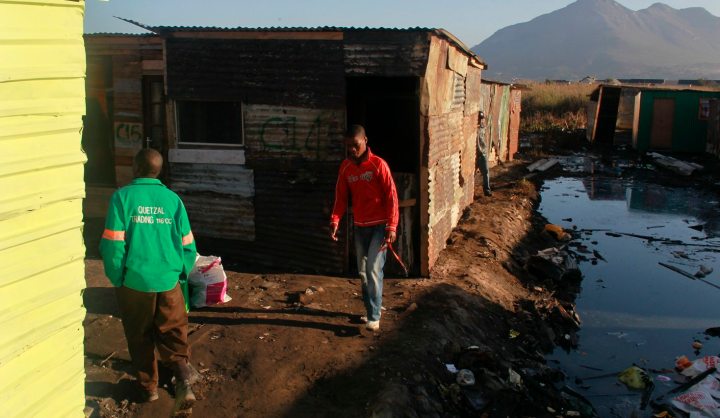Analysis: Where the devil lies in the Municipal Numbers Game

Councils have delivered better access to water, electricity, sanitation and waste removal between June 2014 and mid- 2015, according to the “Non-financial census of municipalities” released by Statistics South Africa (Stats SA) on Tuesday. But the upward trend shows that while hundreds of thousands of more households have such services, the number of indigent and poor households receiving free basic services has stagnated, and not every indigent household that qualifies actually receives such free services. Scratch a little more in the statistical smörgåsbord and the picture of municipal delivery is sharply defined by provincial boundaries and municipal capacity. By MARIANNE MERTEN.
Statistics SA said provision of water is up by 2.5% in 2015, compared to a year earlier. Also up are access to electricity, sewerage and sanitation, and solid waste removal. But the provision of free basic services has not increased proportionally – even if the number of registered indigent households has increased to 3.6-million, up from 3.5-million, countrywide.
Statistician-General Pali Lehohla said one reason was better targeting of indigent households – this was the case in the Western Cape – but also that municipalities are “not fully getting to those who are indigent” and thus deserving. “The picture is a mixed picture,” he added.
And in this detail, the devil lies.
The Stats SA report shows cut-off for free basic services is set at R2,820 monthly income in 158 of the country’s 278 councils. Only 67 municipalities provide free basic services above that income level. As a rule, indigent households have to apply, and prove they qualify, for these free basic services.
According to the 2001 national policy, indigent households are meant to receive free monthly allocations of six kilolitres of water, 50 kilowatt/hour and the average R50 towards sewerage and sanitation and solid waste removal.
But not every of South Africa’s 278 councils has an indigent policy – and even when this exists, implementation appears erratic. And so the indigent living in Gauteng and the Western Cape receive greater access to free services than those living in the Eastern Cape, KwaZulu-Natal, the North West and Limpopo. The skewed implementation of indigent policies seems to back up concerns the Auditor-General recently expressed about the state of local government in North West and Limpopo.
In the Western Cape, 26 of the 30 councils have free basic services policies and all are implementing these. In Gauteng, 10 of the 12 councils also do so as do 20 of the 24 councils in the Free State.
The Western Cape has a somewhat easier job as the numbers of indigent households there has dropped by about 53,000 between 2014 and 2015. And so about 97% of indigent households receive free basic services. In contrast, Gauteng councils had to deal 689,859 indigent households in 2015, about 200,000 more than just a year earlier. While just about every indigent household in Gauteng receives the free electricity allocations, only a little over half, or 360,154, receive the free waste removal and less than half (292,991) receive the free water allocation.
While 44 of the 45 councils in the Eastern Cape have indigent policies – the number of indigent households increased by about 18,000 to 843,181 in 2015 – only 16 were implementing the free basic water policy in 2015. Still, that’s two more councils than in 2014. Just over 60% of indigent households receive free water in the province, and a similar number free sewerage and sanitation, but only a little more than a quarter receive the free waste removal allocation.
In KwaZulu-Natal, 55 of the 61 councils have free basic services policies, but just 17 are implementing free water provision, although that is up by two from a year before. The number of registered indigent households in 2015 dropped to 735,041, about 35,000 fewer than a year earlier. Free water and sanitation services are provided to just over 540,000 households, while 329,900 receive free electricity and 223,940 free solid waste removal services.
In North West, 19 of the province’s 23 councils have such policies, but only 17 are implementing free sanitation and 16 solid waste removal. There were 172,322 indigent households recorded in that province in 2015, down by about 12,000 on a year earlier. However, just 87,162 indigent households receive the sanitation free service, 88,713 the free waste removal and 114,373 free water allocations. Free electricity provision is better at 153,162 indigent households.
And in Limpopo 28 of the 30 councils in that province may have such policies, but only 19 are actually implementing, for example, free sewerage. Of the 401,765 indigent households less than a quarter (94,082) receive solid waste removal free services, just over a quarter sewerage and sanitation services, 158,289 electricity and just under half (183,693) free water allocations.
The Stats SA “Non-financial census of municipalities for the year ending 30 June 2015” also highlights that not all councils have the infrastructure to deliver basic services. Again Gauteng and the Western Cape lead the stakes, while just 22 of Limpopo’s 30 councils have the means to deliver water, as do 15 of the 61 councils in KwaZulu-Natal and 24 of the 45 municipalities in the Eastern Cape.
And after years of talk of local development, not all municipalities have submitted their integrated development plans. According to the Stats SA report, only 244 complied in 2015, down from 254 in 2014.
However, these levels are among the best when it comes to municipal policy compliance. Providing access to water may be up, but monitoring the water quality remains a challenge outside the top-performing provinces of Gauteng and the Western Cape. In KwaZulu-Natal only 16 of the 61 councils monitor water quality, as do nine of the 30 municipalities in Limpopo.
And so the state of local government remains in the balance. DM
Photo: South African men walk between shacks in Masiphumelele, an informal shack settlement in Cape Town, South Africa, on 16 May 2011. EPA/NIC BOTHMA

















 Become an Insider
Become an Insider